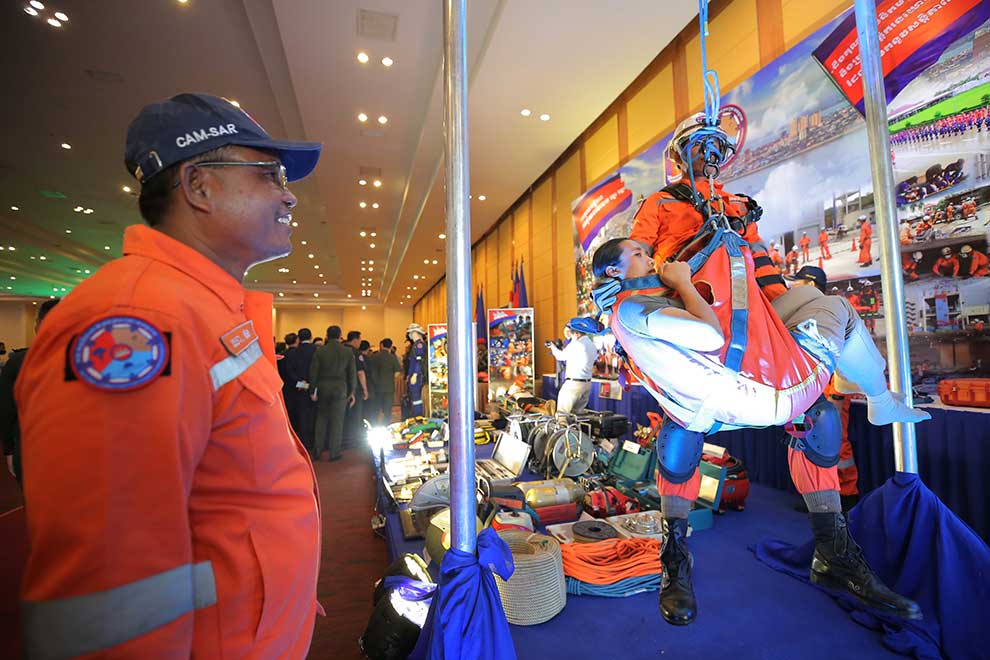
Exhibition of equipment used in disaster rescue operations held at Koh Pich Convention and Exhibition Centre in Phnom Penh on November 1. Hong Menea
Mitigating disaster means minimising impacts on people’s lives and the economy. To manage the risks associated with natural disasters, it is necessary to strengthen cooperation between government institutions and the private sector, which is the Kingdom’s engine room of economic growth, said Senior Minister Kun Kim.
Observing National Day for Disaster Management on November 1 in Phnom Penh, Kim who is the first vice-president of the National Committee for Disaster Management (NCDM) said that once a nation developed a robust economy with resilience and a high capacity for disaster management, it can reduce risks and plan effective responses which will allow it to recover more quickly.
He added that through coherence and interconnection, the private sector cannot be separated from disaster management work. Investing in reducing a businesses’ risk of being affected by a natural disaster is wise, and will contribute to preventing losses and ensuring the sustainability of the business.
“That is why this year’s theme for the National Day for Disaster Management is focused on working with the private sector to improve the balance of local actions for disaster resilience,” he added.
He unveiled plans to establish a search-and-rescue unit for the Kingdom’s oceans and waterways, explaining that the project would require more than $500,000 of investment. Several donors from the private sector had funded inflatable rescue boats, which were each worth more than $20,000.
“Based on the projected costs of the unit, we still need almost $500,000 so the Ministry of National Defence can purchase the vessels and specialised equipment they need,” he said.
He added that the only current unit capable of conducting maritime searches is the Special Forces Command. Recently, the unit participated in the search for the victims of the recent ferry sinking in Kandal province.
Soy Narith, deputy commander of the Brigade 70 in charge of disaster relief, said that with the support of Japan’s Japan Paramedical Rescue (JPR) NGO, the brigade’s 711 intervention unit participated in search-and-rescue operations during disasters such as fires and building collapses. This year, the unit took part in flood rescue operations twice.
“There are many types of disaster. Our unit is focused mainly on firefighting and searching for the victims of building collapses. Our operational team has received extensive training in these areas – as well as in the use of modern equipment – from JPR,” he added.
Kim said that almost every year, Cambodia is affected by floods, droughts, winds, lightning strikes or river bank collapses. In response to these occurrences, the government has prioritised disaster management.
He added that this year’s floods had damaged more than 70,000ha of rice fields and affected infrastructure such as roads, bridges, dams, canals, public administration buildings, schools and health centres, as well as thousands of homes.
He said that with the participation of the private sector and civil society organisations, the NCDM had been able to provide a rapid response to the floods. The government also provided food, new seeds for rice and cash crops, as well as cash payments, to the affected families.
Kong Pum Ngea, 14, who represents the Cambodia Children and Young People Movement for Child Rights, said that although there are some activities that directly involve children and youth, such as climate change counseling, the general awareness and participation of children and youth in establishing disaster resilience remained limited.
“Contributing to the improvement of the balance of local activities for disaster resilience is very important to ensure social welfare and achieve sustainable economic development,” she added.
She also said that in order to respond to challenges in a timely, effective and sustainable manner requires the participation of all relevant parties, including children and youth. All stakeholders have a part to play, including at the community level, she added.














